- 01 Various Overseas Training Programs
- 02 Asia/Europe Collaborative Education Program
- 03 English for International Communication from Foreign Teachers
- 04 TOEIC? measures useful for job hunting and university transfer
- 05 Metaverse English Conversation to Experience Real Life Abroad
- 06 Diverse Electives to Develop Your Potential
- 07 "English + 1 language" qualification measures to prove foreign language proficiency
Various Overseas Training Programs
Kanda Institute of Languages has established partnerships with numerous overseas schools and local companies. Students can participate in short-term training programs and internships in various countries while still in school, regardless of their major language. Students can choose the period, content, and destination to suit their own objectives. Students have ample opportunities to put into practice the language skills and communication skills they have learned in the classroom overseas.
-
Interpreter Assistant Training at the Grammy Awards Pre-Event
(Los Angeles, USA)
-
Interpreter Assistant Training at World Cultural Exchange Event
(Honolulu, USA)
-
Educational Exchange Program at the University of Salamanca
(Spain)
-
Cultural and language hands-on training at the University of Vraper (Thailand)
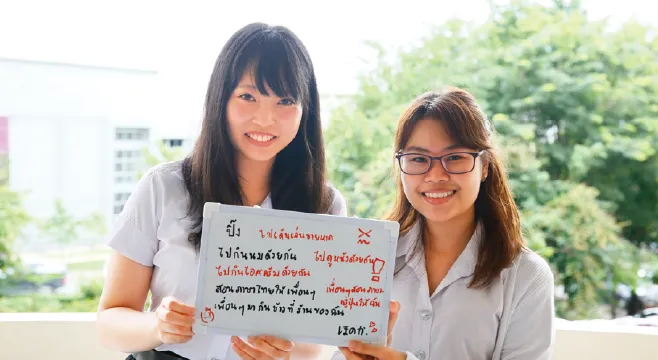
-
Japanese Culture Volunteer Training
(New York, USA)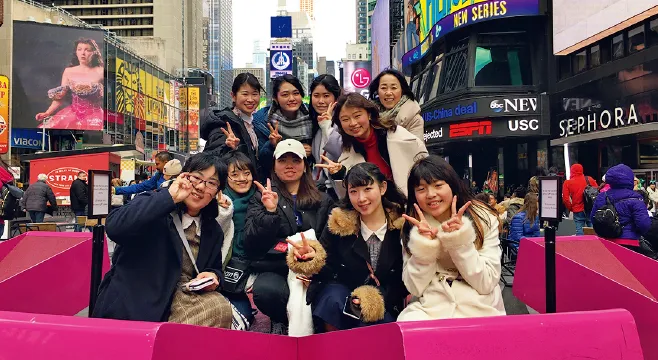
-
Language and Culture Experience Program (Korea)

-
Travel Agency Maps Interview Training
(Vietnam)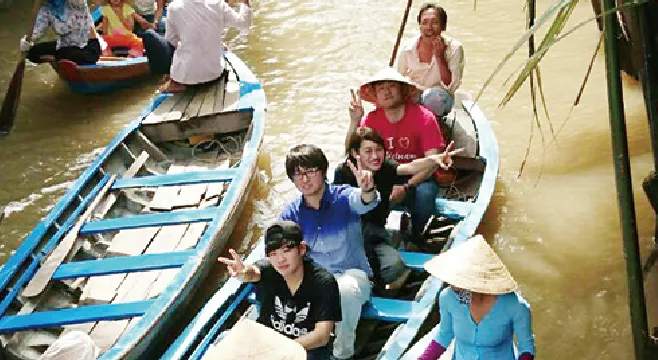
-
Spring Training in the U.K.

-
Collaborative Education Program at Qingdao Binhai College, China

EMBA-ISUGA (France), University of Salamanca (Spain), Qingdao Binhai Institute (China), Chongji University (Korea), Budilhur University (Indonesia), Hanoi University (Vietnam), University of Brapar (Thailand)
Interpreter assistant training at a world cultural exchange event (Honolulu, USA), Japanese culture introduction volunteer training (New York, USA), advertising sales training (Sri Lanka), travel agency map coverage training (Vietnam), spring training in England, summer training in Ireland, language and cultural experience training ( Korea, etc.
Examples of fieldwork:
Asakusa, Tokyo; Kanda, Tokyo; Kamakura, Kanagawa; Joetsu, Niigata; commercial facilities, theme parks, tourist spots, etc.
Asia/Europe Cooperative Education Program
Students who meet certain criteria can transfer to partner universities in Korea or China or to business schools in France for the third year after graduation. If you meet the university's application requirements, you can also transfer to a non-partner university. We also provide information sessions with local university representatives and extensive overseas travel support. Even if you started learning Korean or Chinese from scratch at Kanda Institute of Languages, it is not a dream to transfer to a prestigious local university and earn a degree.
For the third consecutive year, all applicants were accepted to universities in Korea!

- China
-
Partner Schools Chinese Academy of Dalian University of Foreign Languages (Dalian, China) Application Requirements Graduates or prospective graduates of Chinese language course (non-Chinese nationals)
3rd year transfer student...HSK5 level, 2nd year transfer student...HSK4 levelPartner Schools South China University of Technology (Guangzhou) Application Requirements Graduates or prospective graduates of Chinese language courses (non-Chinese nationals)
2nd year transfer students...HSK level 5Partner Schools Northeast Normal University (Changchun) Application Requirements Graduates and prospective graduates of Chinese language courses (non-Chinese nationals)
*Qualifications vary from year to year.Partner Schools Qingdao Binhai Academy (Qingdao) Application Requirements Chinese Language Course, English Major Course, Global Business Course
Graduates or prospective graduates (non-Chinese nationals) HSK Level 5 or above (TOEFL? 500 or
TOEIC? 800 and TOEIC? S&W 120 or above, depending on the department or major)
- China
-
Partner Schools Beijing Language and Culture University (Beijing), Shanghai University (Shanghai), Shenzhen University (Shenzhen) Application Requirements Graduates or prospective graduates of all department courses (non-Chinese nationals)
2nd year transfer...HSK Level 4
*It is possible to transfer to the Tokyo School in the 2nd year and study at the main school in China from the 3rd year.
- Korea
-
Partner Schools Ewha Womans University (Seoul, Korea), Kyunghee University (Seoul, Korea),
Konkuk University (Seoul, Korea), Sangmyung University (Seoul, Korea),
Sungjitsu University (Seoul, Korea), Seoul National University (Seoul, Korea),
Sogang University (Seoul, Korea), Jeju National University (Jeju, Korea),
Chungang University (Seoul, Korea), Hanyang University ERICA (Ansan),
Hankuk University of Foreign Studies (Seoul Special City), Hannam University (Daejeon Metropolitan City),
Myongji University (Seoul Special City)Application Requirements Graduates or prospective graduates of Korean language courses (both you and your parents must be non-Korean nationals)
Korean Language Proficiency Test (TOPIK) Level 3 or above
- France
-
Partner Schools EMBA-EMBA-ISUGA (Quimper, Brittany)
*3-year school for business in France and Asia in "EnglishApplication Requirements Graduates or prospective graduates of 2-year course
From Tokyo Metropolitan Todaiwa Minami High School
Yukina Fujino
Accepted as a 3rd year transfer student, Department of Clothing Industry, Ewha Womans University, Korea
TOEIC? 770, Korean Language Proficiency Test (TOPIK) Level 6 (highest level)
I enrolled in Kanda Institute of Foreign Languages because I became interested in Korean fashion and food culture through Korean TV dramas and wanted to live there. I had many opportunities to speak freely with Korean teachers, and I was able to learn real Korean, which is different from the Korean language used in TV dramas. Occasionally, Korean students visit Japan and we have opportunities for international exchange. We did fieldwork together around Tokyo Station and Asakusa, and had a lot of fun talking about our favorite anime and love stories. I am still connected with them through SNS. Outside of school, I also had the opportunity to volunteer at an international conference where TV drama producers and scriptwriters from Asian countries gathered. I will never forget being able to exchange words in Korean with famous scriptwriters in Korea. In choosing a place to study abroad, I applied to Ewha Womans University, which is well known in Japan and is also prestigious in Korea. Although Ewha Womans University had no experience in transferring students to other universities, they supported us so much that we had nothing to worry about. The transfer requirement was to obtain TOPIK level 4 or above, but I eventually passed level 6, the highest level. I plan to study design extensively while learning about the history of clothing culture and practical production methods. What I want to pursue is fashion that combines the essence of Korea and Japan. I would like to use my skills in both Korean and English to deeply study designs there that I am uniquely qualified to do.
- Course affiliations of students are indicated by the former department name.
KIFL 4Cs─What Kanda Institute of Foreign Languages considers 4Cs
Kanda Institute of Languages has established partnerships with numerous overseas schools and local companies. Students can participate in short-term training programs and internships in various countries while still in school, regardless of their major language. Students can choose the period, content, and destination to suit their own objectives. Students have ample opportunities to put into practice the language skills and communication skills they have learned in the classroom overseas.
-
1
Communication
communication skills
- The ability to accurately understand the scene, situation, and purpose, and to convey them with appropriate expressions.
-
2
Critical Thinking
critical thinking skills
- The ability to discern and accurately understand the true nature of things through critical thinking and perspectives.
-
3
Creativity
creativity
- The ability to think creatively and act creatively on how to express ideas and concepts.
-
4
Collaboration
ability to cooperate
- The ability to work as a team, share knowledge and collaborate with others, and solve problems while learning.
Acquiring English Skills
Communicating
English 4 Skills.
- English Skills
- 1. Reading Skill
- 2. Listening Skill
- 3. Writing Skill
- 4. Speaking Skill
5 Subjects of EIC
- First Year
- Communication Strategies
- English Foundations
- 2nd year
- English in Practice
- Ideas & Opinions
- Project Change
In the first year, foreign faculty members will assign various tasks to students to strengthen their four English skills and presentation skills, and in the second year, students will transform the skills acquired in the first year into abilities that can be used in the business world. As the culmination of two years of study, students will present their solutions to given issues in English.
7 Features of EIC
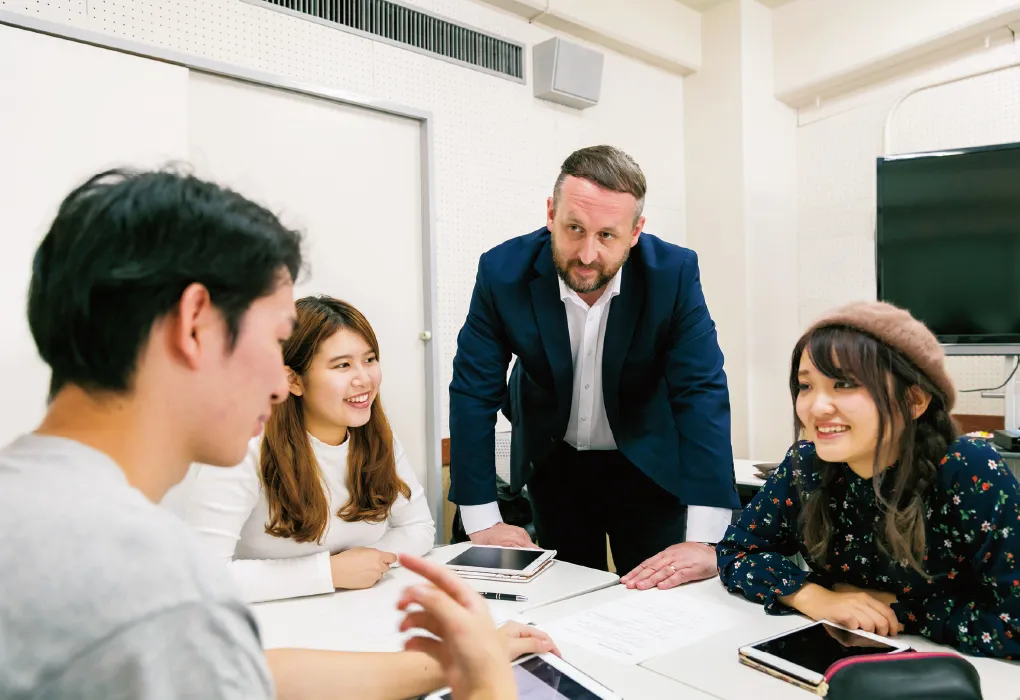

-
Point1Only EnglishThe only available language is English.
- Training to "think in the language" is essential to improving your language skills. It is important to speak English not only with teachers but also with classmates and to immerse yourself in an English-speaking environment.
-
Point25 Times / WeekStudents learn 5 times a week.
- There are five 90-minute classes per week in the first year and four classes per week in the second year. By using English every day, thinking and speaking in English will become a part of your daily life and will no longer be something special. This is the secret to progress.
-
Point320 StudentsLess than 20
proficiency classes. - Classes are small, with no more than 20 students, and are organized by proficiency level. Close proximity to faculty members is another important factor.
-
Point48 TeachersUp to eight
foreign faculty members teach. - Over the course of two years, you will study with a maximum of eight foreign teachers. The teachers change every semester, so you will be exposed to English from different countries and regions, and you will be able to experience the culture of each country and region firsthand.
-
Point5Task-BasedPractical
Problem-based learning - This is active learning in which students solve problems and issues by communicating with faculty and classmates. By experiencing actual situations and how to communicate, students will acquire practical English expressions.
-
Point6Topic-Oriented×ICTThe latest English x digital teaching materials.
- Students will cover a variety of topics using a laptop computer that will be loaned to them upon enrollment. In addition, all original EIC teaching materials are digitalized.
-
Point7Communicative ApproachA class where conversation is in full swing.
- Students will be able to share their thoughts, feelings, and experiences with faculty and classmates in their own words.
Students will acquire English language skills that will enable them to play an active role in society with confidence.
TOEIC? Preparation
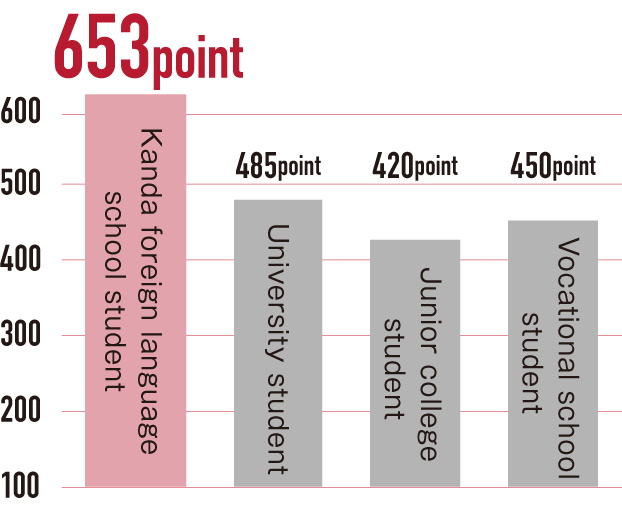
? Average score by TOEIC? test taker
- Average score of 2nd year students at Kanda Institute of Languages
- 653points
- Number of students who obtained a score of 700 or higher while in school
- one in three
- ? Kanda Institute of Languages results are as of the end of February 2024. Excluding Asian/European Language Department and Study Abroad Department.
- ? Source: "TOEIC?Program DATA & ANALYSIS 2022," International Business Communication Association
-
Students study with TOEIC?-savvy teachers in
level-based classes. - Students are required to take the TOEIC? test four times in their first year and three times in their second year, and teachers use the TOEIC? scores to analyze students' weak areas and guide them on effective learning methods. This allows students to continue to study in an environment that is appropriate for their level of proficiency. Students who achieve a TOEIC? score of 700 or higher during their studies are eligible to apply for a scholarship after graduation.
- TOEIC? scores are important in a variety of settings.
-
business - Utilized to measure the English language skills of new employees.
- Used as a standard for overseas business trips and expatriation.
- Utilized as a requirement for promotion and advancement.
- Expect to obtain 660-840 points in the international category.
(TOEIC? official website operated by the International Business Communication Association
post-secondary education institution, incl. university, college, etc. - Adopted as one of the application requirements for the entrance examination.
- Adopted as the English subject test in the transfer examination.
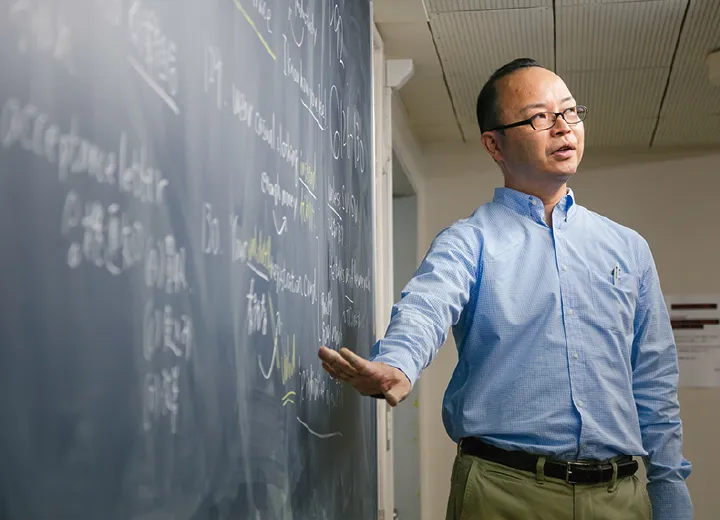
TOEIC? score improvement requires the three skills of English, test-taking skills, and hard work, and in TOEIC? classes, students will learn not only how to improve their English for business situations, but also effective test-taking skills and the importance of continuing to work hard.
Graduated from Kobe City University of Foreign Studies, Faculty of Foreign Languages, Department of English and American Studies. 990 TOEIC?. He holds a TOEIC? score of 990 and is a Level 1 certified English language proficiency test holder.
Under the pen name "TEX Kato," he has written many books related to TOEIC?, including "TOEIC? L & R TEST Degakutan Tokkyu Kin no Phrase" (Asahi Shinbun Publishing) and "Shin TOEIC? Test Grammar Mondai de De 1000 Mondai" (Ask).
Not only the common subject TOEIC?, but also
numerous supports to ensure that you achieve your goals.
Support
We always keep track of our own abilities and set goals for each of us.
All students must take the TOEIC? 7 times (required)
In order to familiarize students with TOEIC? questions and help them obtain a high score, there are a total of seven required on-campus examinations: four in the first year and three in the second year.
TOEIC? test available on campus every month (optional: fee required)
In addition to the seven required examinations, students who wish to take the TOEIC? (optional: fee required), which is administered on campus every month, can take the TOEIC? (optional: fee required) according to their own goals and objectives.
-
On-campus TOEIC?(required)
Exam Schedule -
On-campus TOEIC? (optional) conducted monthly

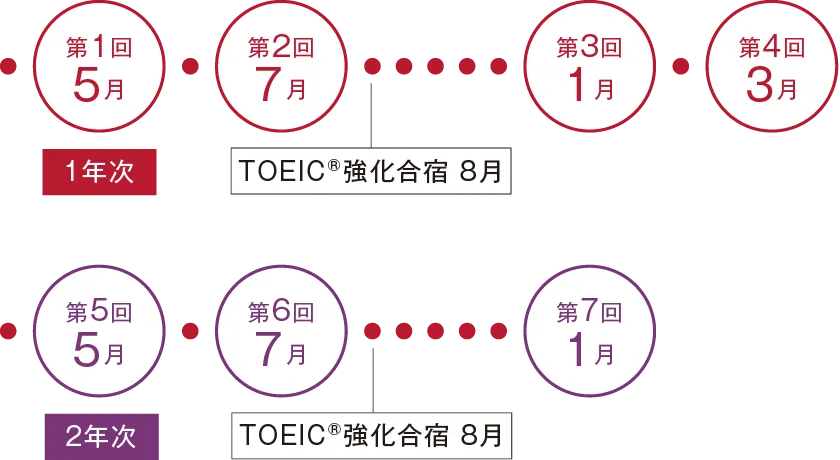
We have established reference points for advancement and graduation
All students must take the TOEIC? 7 times (required)
In order to familiarize students with TOEIC? questions and help them obtain a high score, there are a total of seven required on-campus examinations: four in the first year and three in the second year.
All students must take the TOEIC? 7 times (required)
In order to familiarize students with TOEIC? questions and help them obtain a high score, there are a total of seven required on-campus examinations: four in the first year and three in the second year.
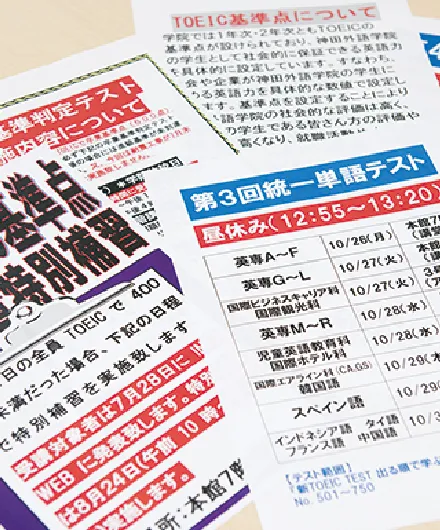
We offer a variety of opportunities to steadily improve your English skills.
TOEIC? vocabulary test for all students (required)
Vocabulary tests are administered regularly to build vocabulary skills that will be the foundation for improving scores.
TOEIC? preparation courses offered as electives and extracurricular activities
TOEIC? preparation courses by skill and level are also available in elective and extracurricular courses (for a fee). Students can study according to their own issues, such as overcoming weak points.
TOEIC? training camp (optional, charged)
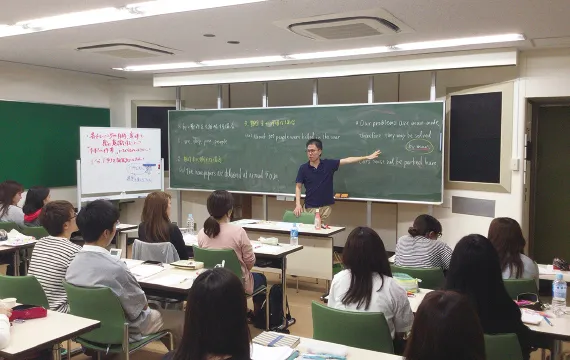
During the summer vacation period, we hold a TOEIC? training camp at an outside training facility. Through this intensive one-week study program, we aim to increase the TOEIC score by 100 points or more from the latest score, learn efficient study methods, and develop study habits.
TOEIC? Study Support Center
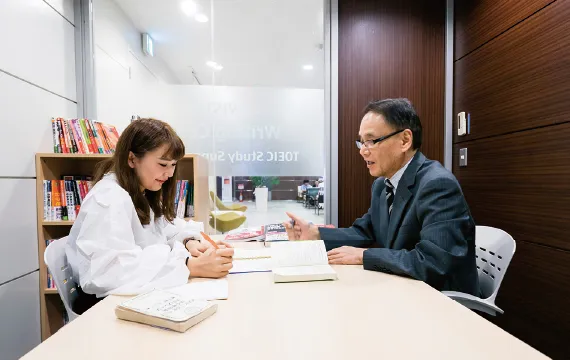
There is a professional advisor to guide students in preparing for the TOEIC? exam, which is appropriate for each student. Students are always welcome to consult with us individually according to their level of understanding and study progress.
In the TOEIC? class, an expert teacher carefully teaches each part. As a result of continuing to practice the study methods taught by the teacher, my TOEIC? score increased by 535 points in one year! Finally, my best score was 940 points.
Kenichi Koizumi
After attending the TOEIC? camp
score increased significantly in one month!
The TOEIC? training camp increased my vocabulary, and I was able to fill in the blanks and read long passages with ease! As a result of concentrated study on tips to get a high score, I was able to improve both listening and reading skills in a short period of time in a well-balanced manner.
Marie Nagaya
All student course affiliations are listed under the former department name.
HELP - Hybrid English Learning Program -
Kanda Institute of Languages has established partnerships with numerous overseas schools and local companies. Students can participate in short-term training programs and internships in various countries while still in school, regardless of their major language. Students can choose the period, content, and destination to suit their own objectives. Students have ample opportunities to put into practice the language skills and communication skills they have learned in the classroom overseas.
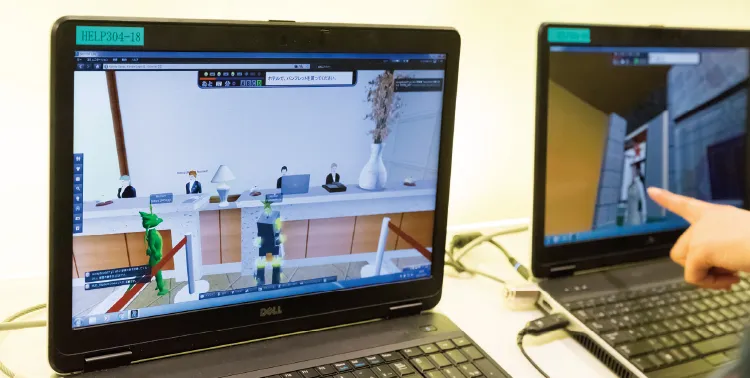

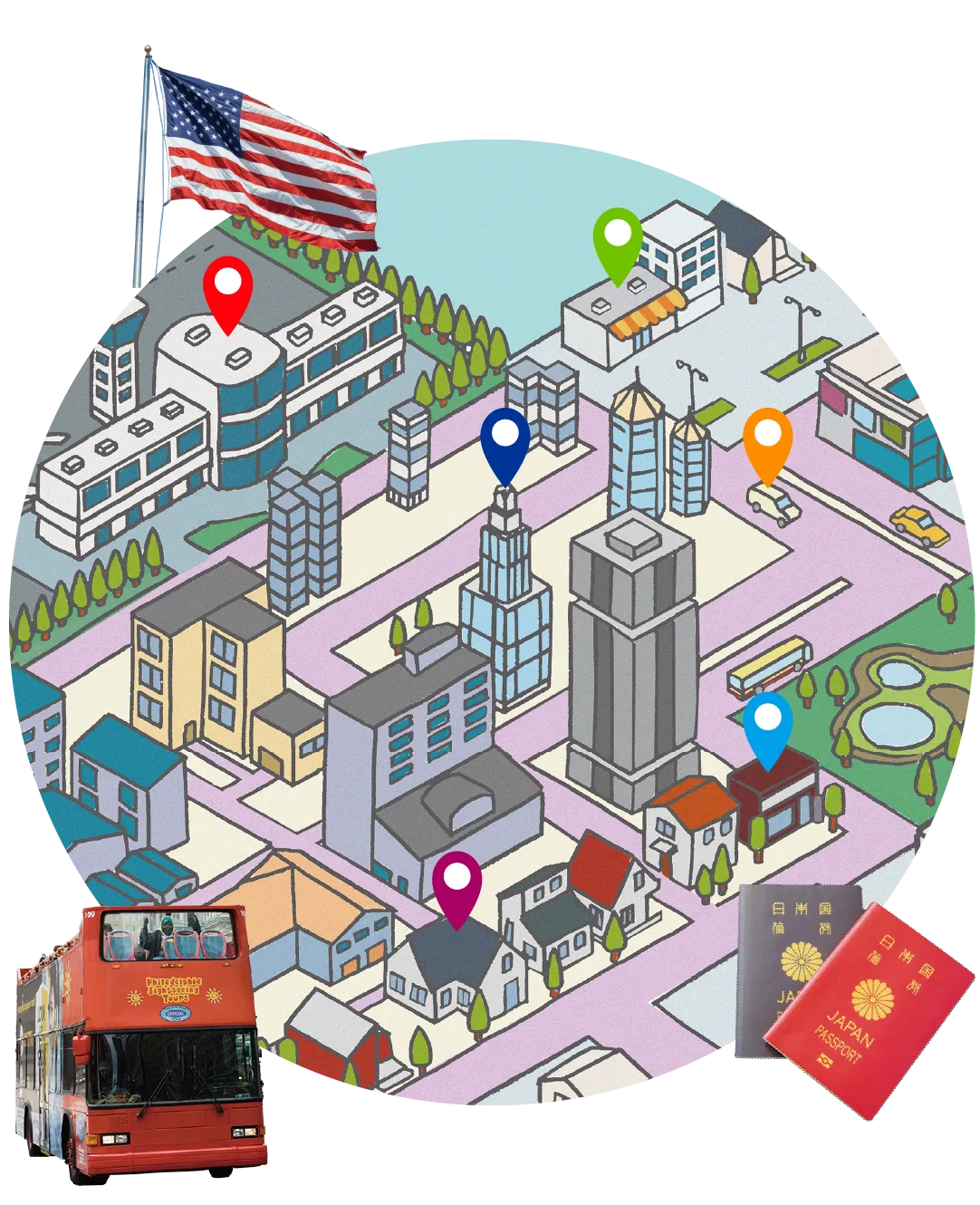
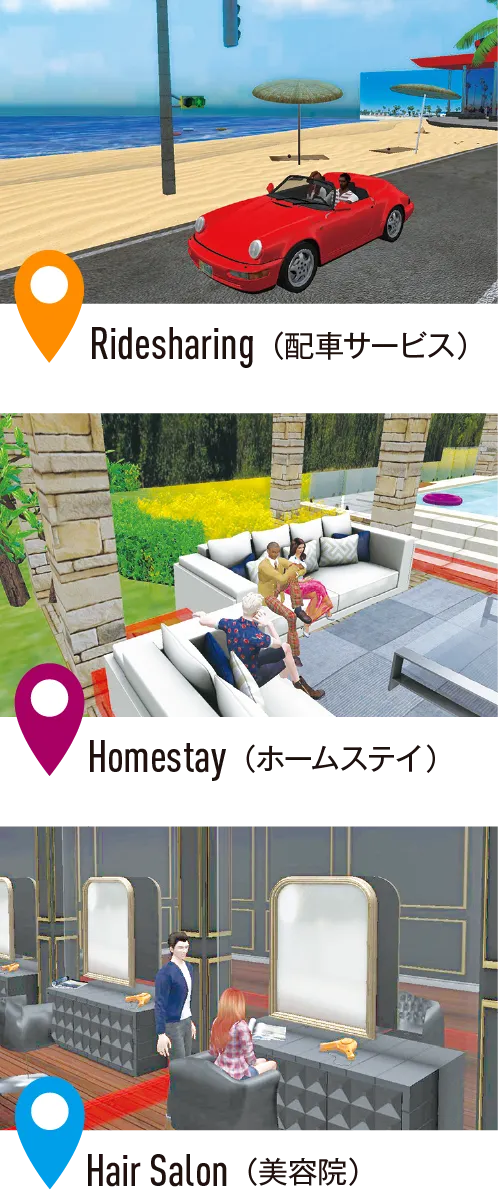
the expressions they learn in class while having fun and conversing like a game.
Their conversation partner is a foreign teacher in a separate room. They check expressions, pronunciation, etc., and provide feedback after the session.
Diverse Elective Courses
Students can choose to study a variety of languages across course boundaries, including Korean through K-POP, Spanish for travel, and many other subjects that students can enjoy while learning. Online international exchange with students from around the world, and courses to prepare for the overseas mission dispatcher exam, which requires students to work at embassies around the world, are also available. Students can broaden their career paths after graduation while aiming to become multilingual human resources.
English Discussion / TOEFL? Preparation Course (Intermediate) / IELTS Preparation Course (Intermediate) / Business Career Development Seminar / Korean Language Learned from K-POP / Introduction to Korean Language / Introduction to Korean Interpretation and Translation / Introduction to Chinese Language / Introduction to Spanish Language / Introduction to French Language / SPI Preparation / TOEIC? Intermediate Preparation for SPI / TOEIC? Intermediate / Online International Exchange / Preparation for Overseas Embassy and Consulate Deputies / Academic Skills, etc. (Courses may not be offered depending on the year.)
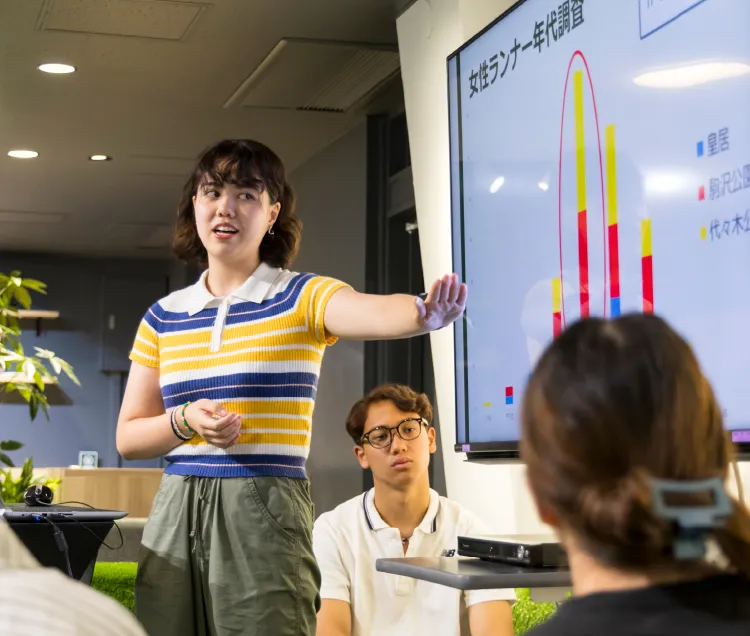
Qualification measures
Foreign faculty members of each major language are experts in second language teaching. Students develop their English plus one language skills to a business level. FLL (Foreign Language Lounge) is available for students to ask questions to instructors outside of class. Students can acquire qualifications to prove their foreign language proficiency and use them for job hunting and university transfer.
TOEIC? 700+, Practical French Proficiency Test Level 2, DELF "A2", Spanish Proficiency Test Level 4, DELE Spanish Proficiency Test B1, Chinese Proficiency Test Level 3, HSK Level 5, "Hangul" Proficiency Test Level 2, Korean Language Proficiency Test (TOPIK) Level 5, etc.
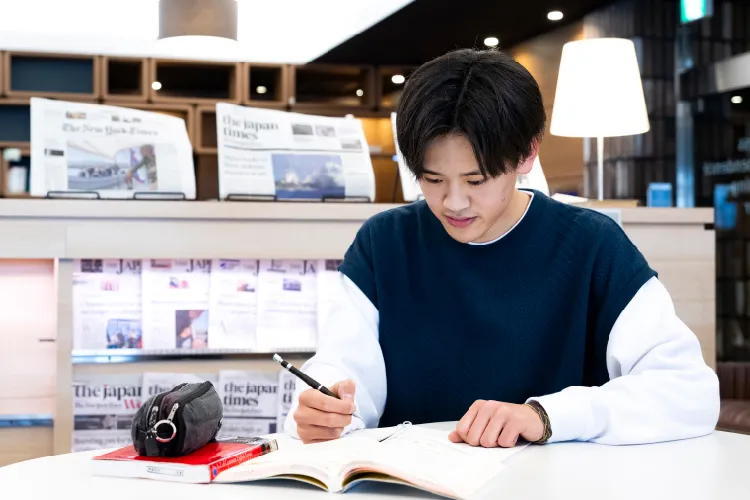
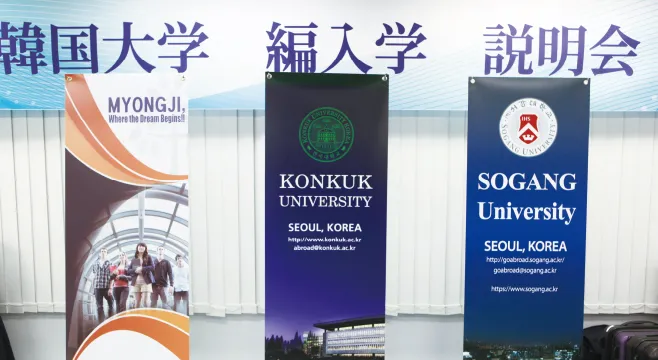



I was not a good student, but I got a
TOEIC? high score!